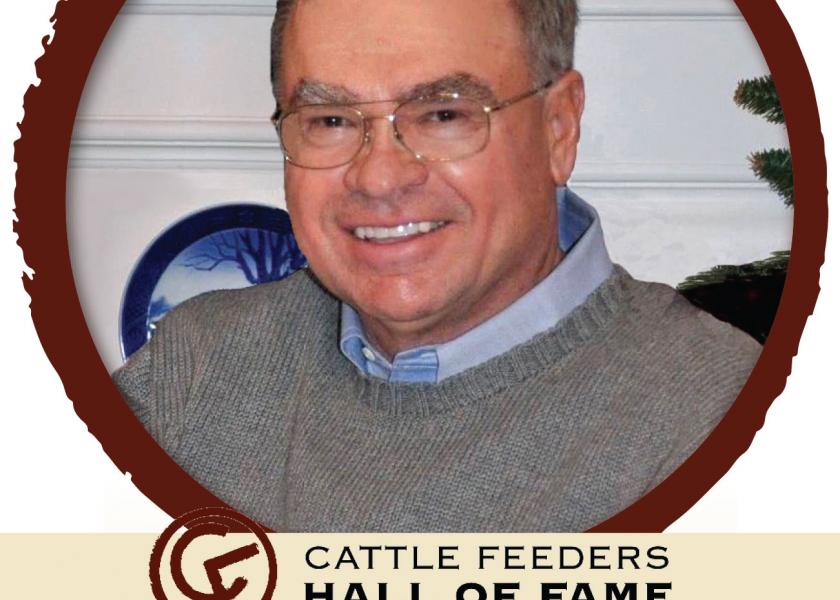Cornhusker Builds Texas Cattle Empire

Cattle feeder, farmer, rancher, pilot, astute businessman and good neighbor: All these terms describe different aspects of Don Oppliger, one of this year’s inductees into the Cattle Feeders Hall of Fame. The posthumous induction honors Oppliger’s entrepreneurial spirit, through which he established integrated farming, ranching and cattle-feeding operations across several states prior to his untimely death in a 2017 helicopter accident.
A native of Columbus, Neb., Oppliger attended the University of Nebraska and remained a devoted fan of Cornhuskers football throughout his life. However, a single state, even one as big as Nebraska, couldn’t contain his entrepreneurial visions.
Oppliger began his agricultural empire in 1980, growing corn on some rented land near Hereford, Texas. He soon recognized cattle feeding as an opportunity to integrate operations and add value to his crops, and purchased a 15,000-head feedlot near Farwell, Texas. By 1991, Oppliger had added a 35,000-head feedlot near Clovis, N.M., along with more irrigated farmland in Texas and New Mexico.
 During the late 1990s, Oppliger expanded his Amarillo-based company, Oppliger Land & Cattle, into his home state of Nebraska. He purchased a large farm in Lincoln County, and used some of the land to build a feedlot with capacity for 55,000 head, which later expanded to 70,000 head.
During the late 1990s, Oppliger expanded his Amarillo-based company, Oppliger Land & Cattle, into his home state of Nebraska. He purchased a large farm in Lincoln County, and used some of the land to build a feedlot with capacity for 55,000 head, which later expanded to 70,000 head.
Eventually, the Oppliger operation grew to include five feedlots spread across Nebraska, New Mexico and Texas with a 230,000-head total capacity, along with over 55,000 acres of cropland and thousands more of ranchland for grazing. Currently, the NCBA ranks Oppliger Companies as the 13th largest cattle feeding operation in the U.S.
By establishing feedlots near his company’s farming operations, and by accumulating grazing acreage in the Midwest
and southern Plains, Oppliger realized the economic benefits of integrating and managing supply chains in ways that allowed him to respond to market signals and consumer trends.
According to the company website, the strength of the cattle-feeding division lies in Oppliger’s vertically-integrated agricultural and ranching operations.
“Such an expansive agricultural operation, along with hundreds of acres of ranchland, allow us to quickly fine-tune and change cattle rations and gain-weights in response to commodity prices and environmental conditions. That results in improved cattle performance and a better profit margin for our customers.”
The website also notes the focus on animal welfare and sustainability. “Our system’s environmental edge is simple: we produce more meat with less cattle, and do so more efficiently, using our feedlot system rather than a pure grass-fed system. That results in numerous environmental advantages over grass-fed systems, including less methane and nitrous oxide emissions, less water use and less land use.”
Even as his business enterprise grew more complex, Oppliger was known for his sharp memory and ability to recall detailed figures and information, only occasionally referring to a notepad he carried in his shirt pocket. Oppliger’s friends, neighbors and acquaintances were known to describe him as friendly, down-to-earth and unpretentious.
Oppliger was an accomplished pilot, flying helicopters and fixed-wing airplanes. He frequently took to the skies to visit his company’s far-flung operations. He kept a hands-on approach to cattle management, using aircraft to check cattle in remote pastures.
He also remained loyal to the University of Nebraska and its sports program, regularly flying to Lincoln for Cornhuskers home football games. His son, Ben Oppliger, also is a pilot, and the two enjoyed flying together for business and pleasure.







